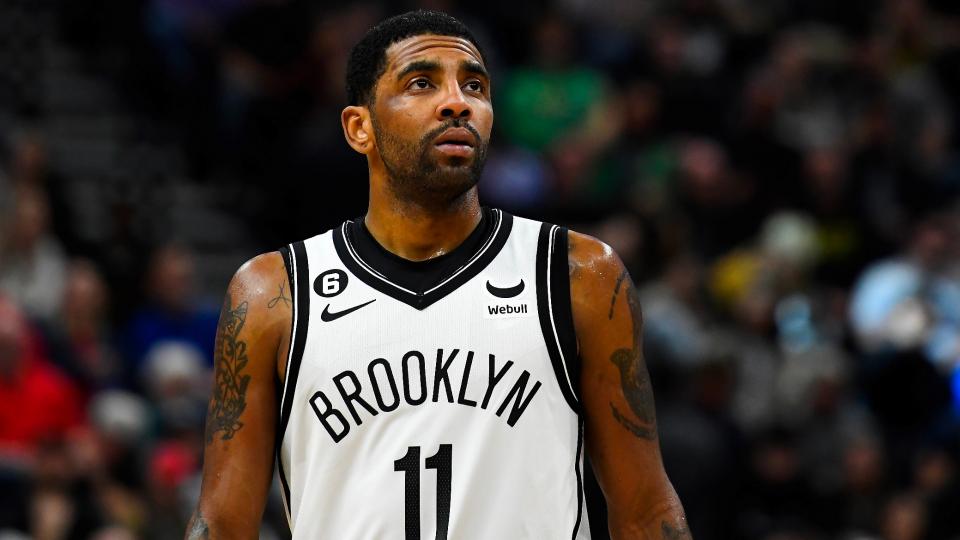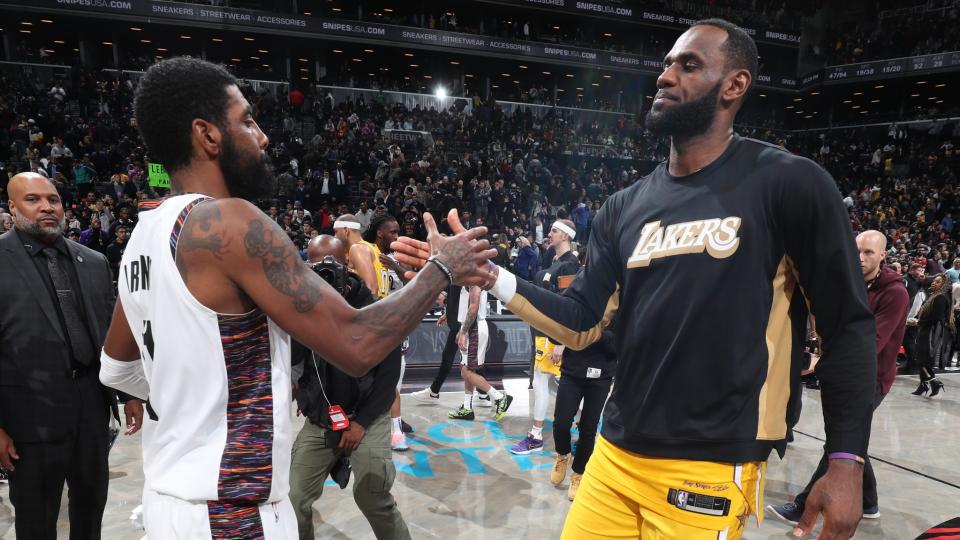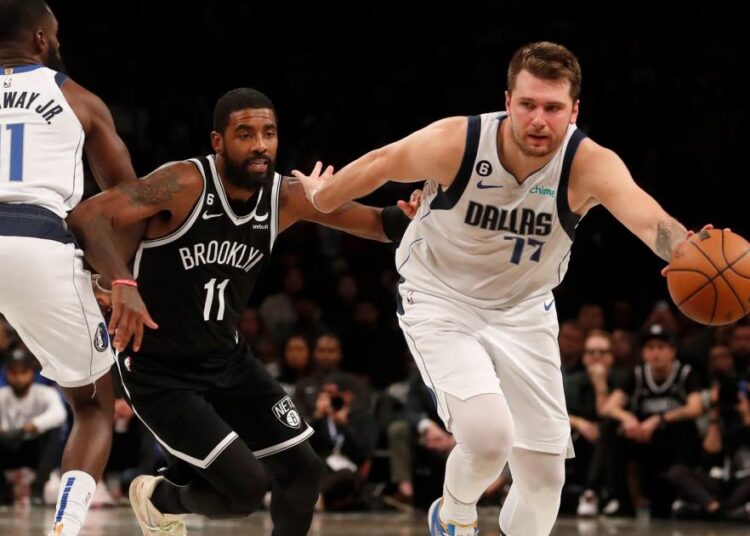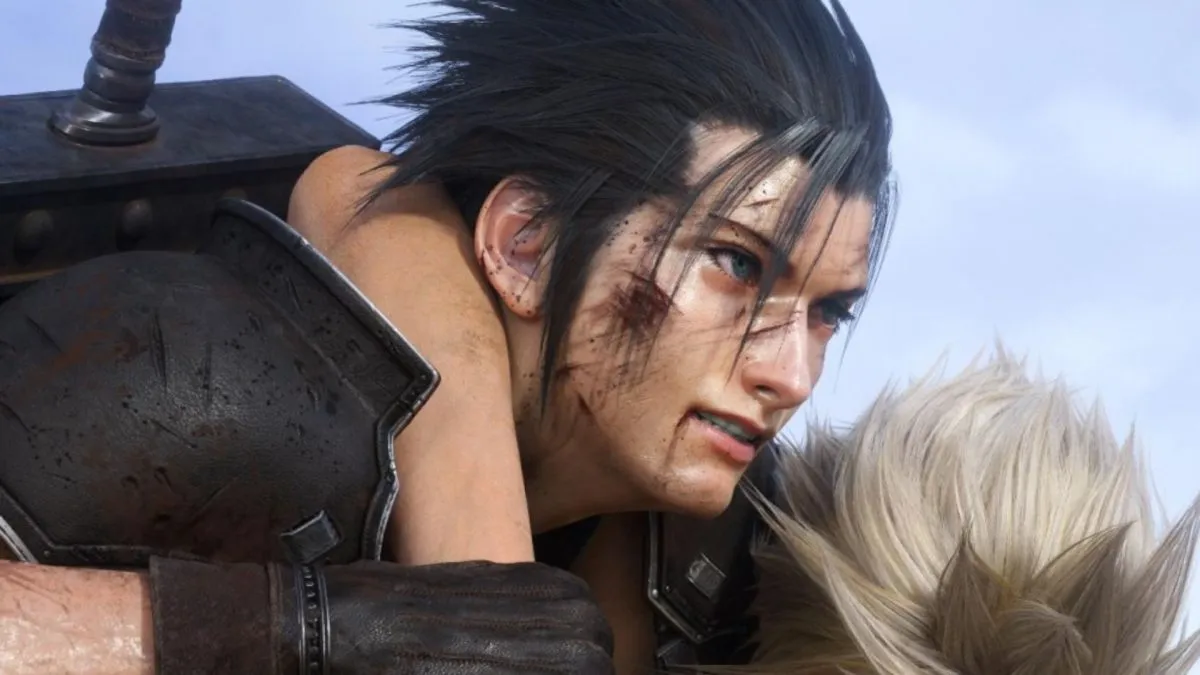Kyrie Irving and the Mavericks have made an unlikely partnership for at least the rest of the season. What happens in this year’s playoffs will be a fascinating question.
A potentially even more interesting one is what happens this summer.
Where will Irving be playing next season? What should the Mavericks do? And can a judge annul this shotgun wedding if it turns into an immediate train wreck?
There’s been plenty of discussion on the immediate impact of Irving joining Luka Doncic and the Mavericks. Here are some answers to the long-term questions arising from the trade.
SIGN UP TO WATCH EVERY GAME ON NBA LEAGUE PASS: U.S. and U.K. | All other countries
Should the Mavericks have waited for a better trade?
The Mavericks are clearly taking a big risk of losing Doncic by adding the mercurial Irving. But here’s the thing that isn’t being discussed enough — that was probably on course to happen anyway.
There have been loud rumblings that Doncic was unhappy with the way things were going. Staying the course probably wasn’t going to work either.
Yes, bringing in Irving is a massive gamble, but sometimes, the biggest gamble is the one you don’t take. Waiting for another star to become available — and for Doncic to stay patient until that happened — may have been even riskier than the path that the Mavericks ultimately chose.
And there is a way that this works out for the Mavs.
Irving has shown that his game can fit alongside a superstar like Doncic in his stints with LeBron James and Brooklyn’s “Big Three.” Although it ended poorly and they were rarely all together, Irving, Kevin Durant and James Harden were destroying teams when healthy. Irving and Durant also just ripped off 18 wins in 20 games last month.
The Mavericks made the Western Conference Finals last season, and they didn’t have any shot of repeating that success without making a trade like this. They didn’t have the assets to go after a player like Durant. A distressed asset like Irving was the highest-upside player that they could have gotten.

What is Kyrie Irving actually worth on his next contract?
There has been much discussion about the reticence of teams to trade for Irving and then extend him to a multi-year deal. It’s obviously a scary prospect to commit to him long-term.
On the other hand, signing Irving for one or two years still remains a decent proposition. The Mavs will be able to extend him for up to two years and around $80 million, or re-sign him to a bigger four-year deal if he hits unrestricted free agency this summer.
Irving’s on-court value is tough to peg because he misses so many games. But assuming he can make it through 60 games next season, my simple salary model has him at $37.5 million in annual value.
Putting aside the off-court issues, Irving is still a really good player, as evidenced by his All-Star starting nod and 27.1 points per game average this season. Barring any more drama, he should live up to that contract.
Of course, recent history has shown that drama may be difficult to avoid.

What are other possible landing spots for Kyrie Irving this summer?
The Mavericks don’t have to offer Irving the maximum allowed under that extension because there aren’t a lot of teams that can realistically compete to sign him.
For the most part, the teams with cap space this summer are not going to be places where Irving will want to play. The Rockets, Spurs, Pistons, Magic and Pacers have over $30 million in cap space, but they are nowhere close to contending for a championship.
The one interesting possibility is the Jazz, who will have more than $40 million available this summer. The Athletic’s Sam Amick reported that Jazz CEO Danny Ainge “doesn’t have the same sorts of reservations about Irving as many others,” and those two have history dating back to their Boston days together.
The Lakers could also still try to make a run at Irving with cap space. But they would have to let Rui Hachimura walk in free agency, and they just spent three second-round picks to acquire him.
.jpg)
What if the Kyrie Irving trade doesn’t work out for the Mavericks?
There’s the short-term and the long-term.
If this thing blows up quickly, then it won’t be franchise-crippling for the Mavs. They will have burned draft equity and good players, but they will also open up about $24 million in cap space, per estimates from Spotrac’s Keith Smith, with a possibility to get north of $30 million in space.
That cap space should allow the team to replace some of what they had in Dorian Finney-Smith and Spencer Dinwiddie. There’s also the possibility of recouping some of Irving’s value via a sign-and-trade. That path would be mutually beneficial, allowing him to go to a contending team that may not have the cap space to sign him outright.
The long-term situation is a lot messier. If the Mavs believe in the pairing and go on to extend Irving to a multi-year deal, then they are choosing to sink-or-swim with Irving.
Irving has already shown himself to have some trade value left, as evidenced by the multiple offers that the Nets received. But if things end poorly in Dallas, then there likely won’t be that same level of interest.
An older Irving, after blowing up yet another team and on a multi-year deal instead of an expiring one, isn’t going to fetch much. And the Mavs will only have two future first-round picks available to trade after this summer in the event that they need to attach picks to move his big salary.
Then there’s the Doncic question. Will he demand a trade as well? It’s a doomsday scenario for the Mavericks — and one that the rest of the league has to be waiting on. For that reason, they have to either cut bait quickly or pray that this works long-term.
Read the full article here


























